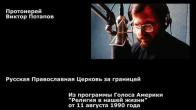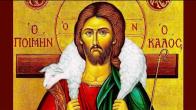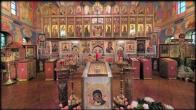ABOUT ORTHODOXY
You are here
The Parable of the Pearl
The parable of the pearl, which we encounter in the thirteenth chapter of the Gospel according to Matthew, in the profundity of its meaning is very much like the previous parable of the treasure hid in the field.
Again, the kingdom of heaven is like unto a merchant man, seeking goodly pearls: who, when he had found one pearl of great price, went and sold all that he had, and bought it (Matthew 13:45-46).
In antiquity, pearls where valued very much, perhaps even more than in our time. Christ's contemporaries were ready to pay a great deal for a good pearl, and therefore they understood perfectly well the words of Jesus, that in order to acquire the Kingdom of Heaven it is necessary to give up everything for the sake of acquiring that which Christ offered to them.
In the parable, the pearl is the symbol of the Gospel preaching. The merchants are men who are seeking knowledge. In the world there are many pearls, i.e., many forms of knowledge, but only one knowledge is genuinely precious faith in Jesus Christ. It is appropriate to compare men who are carefully acquiring the knowledge of Christ and are gradually apprehending the truths of the evangelical life that leads to the blessedness of the Kingdom of Heaven, with a merchant who seeks pearls, and, who having sold many small ones, buys with the money gained from them the one that is unique and precious. "He that possesses the pearl knows that he is rich," says John Chrysostom, "but others often do not know that they have a pearl in their hands, because the pearl is not big: the same can also be said about the truth. Those possessing it know that they are rich, but unbelievers, not understanding the value of this treasure, do not know of our wealth."
If in the parable of the treasure hid in the field the discourse was about the sudden finding of God's truth, then the parable of the pearl tells about the finding of this truth after a long search. Such was the path of Prince Vladimir, the Enlightener of the Russian people, who in the Church's troparion is directly called "the merchant who sought the goodly pearl". He sought the truth faith and found it. As a Christian, Prince Vladimir was able to value the Gospel as the most precious thing that a man can have and Christ as the Only One Whom it is possible to submit to until the end and to serve.
Saint Justin the Philosopher can serve as an example of one who sought the truth and found it only in the teaching of Christ. In his work "Dialogue with Tripho, a Jew", he writes that while still a pagan he studied all the philosophical systems of that time (Second Century) and was especially enamored of Plato's teaching. But all his knowledge did not give him an answer to the questions that interested him about God, about the soul, its immortality, etc., until an elder (Saint Polycarp, according to tradition) told him about Jesus Christ and the prophets who foretold His coming. Having studied the prophecies and the Gospel itself, Saint Justin found the one true and beneficial philosophy the pearl only in them.
In the lives of the holy God pleasers it is possible to find not a few examples of how the words of Sacred Scripture, sinking down into the souls of men who were unbelievers but who were seeking the pearl, put them on the track of this treasure to faith in Christ and to life in Him.
So let each of also also seek this one pearl which is the most precious the faith of the Gospel. Search the scriptures …. says the Lord …they are they which testify of me (John 5:38). We shall find the precious pearl of Christ by attentive and prayerful study of the word of God, for it brings us to the narrow way of finding that which the Lord spoke of to Martha, the sister of Lazarus who was dead for four days the one thing… needful (Luke 10:42).
In the book "Way of the Ascetics", by Tito Colliander, we encounter a chapter under the title "On the Pearl of Great Price". The author writes of the signs of finding the precious pearl: "…the deepe r you pressed into your own heart, the farther and higher you climbed out of yourself. The outward conditions of your life are the same: you wash dishes and care for the children, you go to work, draw your salary and pay your taxes. You do everything pertaining to your external life as a person in a society, since there is no chance of leaving it. But you have resigned yourself. You have given away one thing in order to receive another.
"…and if I have Thee, what more do I ask on earth? Nothing, answers St. John Climacus, but ceaselessly praying, silently to cling to Thee. Some are enslaved by riches, others by honour, still others by acquiring possessions; my only desire is to cling to God.
"Prayer, with all it contains of self renunciation, has become your real life, which you keep up as though only for the sake of prayer. Walking with God (Genesis 6:9) is from now on the only thing that has real value for you, and it includes all heavenly and earthly events. For him who bears Christ within himself there is neither death nor illness or any earthly clamour; he has already stepped into eternal life, and that embraces everything.
"Night and day the heavenly seed sprouts in your heart and grows, you know not how. The earth produces of itself, your heart's soil, first the blade, then the ear, then the full grain in the ear (Mark 4:27-28).
"The saints speak of something they call the inextinguishable light. It is a light not of the eye but of the heart that never ceases to walk in purity and clearness. It swiftly leaves the darkness behind, and constantly strives towards the day's height. Its constant quality is to be continually purified. This is the light of eternity that can never go out, and that shines through the veil of time and matter. But the saints never say that this light is given to them, but that it is given only to those who have purified their hearts in love for the Lord on the narrow way which they have freely chosen."
It is worth renouncing everything for the sake of obtaining that which Christ offers us the pear of His teaching and the life of blessedness in Him.
©V. Potapov
PARISH LIFE
Address of our Cathedral
Subscribe to our mailing list
While all the materials on this site are copyrighted, you may use them freely as long as you treat them
with respect and provide attribution on the Russian Orthodox Cathedral of St.John the Baptist of Washington DC.









